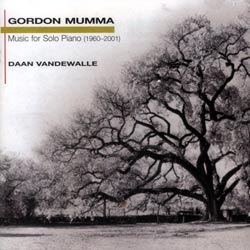
Though only consisting of two discs there's something almost forbiddingly massive about this set: Twelve "suites" (plus a single piece) of piano music comprising 75 tracks, it's a lot to absorb, even in relatively bite-size segments. However, perhaps surprisingly considering Mumma's avant reputation, is how accommodating, even accessible, much of the music turns out to be.
Referents abound but right from the opening notes of "Poplars", a portion of "Jardin" (1958-97), Satie is in the forefront. Mumma manages to extract a kind of "essence of Satie melody" in this and other works, a reduction of sorts, combined with the calm stasis the earlier composer often achieved. This lovely aura is in no small part due to the sensitive touch and pacing of pianist Daan Vandewalle. Not that one would mistake these pieces for Satie, but there's certainly a kinship. Tempi are stretched, notes are bent, but there's often more than a few aural footholds for the innocent listener to latch onto. The spikiness one might expect of a contemporary composer does raise its head every so often — it's a welcome tonic, actually, in this context — but it's generally tempered by a somber serenity, with a decided nod toward Morton Feldman.
The dedicatees of the pieces serve as additional signposts; one finds Christian Wolff, David Tudor, Lou Harrison, Agnes Martin and Robert Ashley among many others. The sheer scope of this release makes picking out highlights a difficult and largely fruitless task (re-listens inevitably reveal previously underappreciated gems). But the six portions of "Basket of Strays" (1970-2001) are especially delightful in their playfulness and beautifully subtle melodic lines. The "Sushibox" works are generally a joy, as is the trio in "Threesome" (all lovingly suspended vapors of chords in the first section, a sumptuous chorale to follow, ending with a rollicking, Ivesian romp) and the "Eleven Note Pieces & Decimal Passacaglia", where extreme brevity (as little as eight seconds) contains small worlds. For this listener, however, the deepest music is found on the concluding, single work, "Large Size Mograph 1962". Here, the time-suspension is perfectly balanced with a kind of unsentimental nostalgia, capacious in feeling but iron-beamed, imbued equally with a sense of wonder and of hard curiosity.
Comments and Feedback:
|



